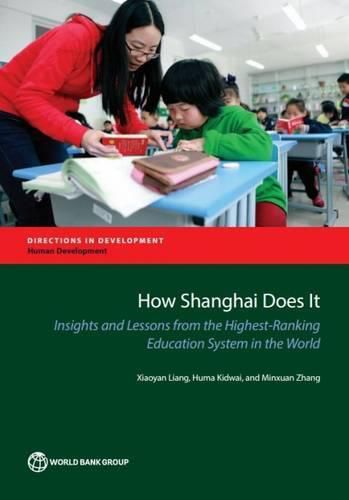Readings Newsletter
Become a Readings Member to make your shopping experience even easier.
Sign in or sign up for free!
You’re not far away from qualifying for FREE standard shipping within Australia
You’ve qualified for FREE standard shipping within Australia
The cart is loading…






The Shanghai basic education system has garnered significant attention since its extraordinary performance in the 2009 and 2012 Programme for International Student Assessment (PISA), a global assessment of 15-year-olds’ educational abilities. Among the 65 participating economies in 2012, Shanghai-China ranked first on all three major domains of PISA, i.e. mathematics, reading, and science. Shanghai also stands out for having the world’s highest percentage of resilient students , students from socio-economically disadvantaged backgrounds who emerge as top performers. Shanghai’s PISA story has generated intense discussions and diverse speculations in field of international educational development, and numerous studies have been done in the attempt to unravel the mystery. Missing from the picture however is a more comprehensive, systematic, in-depth, and objective rendition of the policies and practices of Shanghai basic education, benchmarked against others in key dimensions. This report presents an in-depth examination of how Shanghai scored highest in the areas of reading, science, and mathematics on PISA. It documents and benchmarks key policies in basic Shanghai education, provides evidence on the extent to which these policies have been implemented in schools, and explores how these policies have affected learning outcomes. The report uses PISA 2012 data to analyse Shanghai student achievement variation and to examine the extent school variables may be associated with the variation beyond family and student background. It also uses the World Bank’s Systems Approach for Better Education Results (SABER), an existing systems diagnostic and benchmarking tool, as an organising framework and for data collection. School-based surveys and other existing research shed further light on educational impact and implementation. While the report attempts to adopt a systems approach, particular emphasis is placed on teachers, education financing, balancing autonomy and accountability, and student assessment.
$9.00 standard shipping within Australia
FREE standard shipping within Australia for orders over $100.00
Express & International shipping calculated at checkout
The Shanghai basic education system has garnered significant attention since its extraordinary performance in the 2009 and 2012 Programme for International Student Assessment (PISA), a global assessment of 15-year-olds’ educational abilities. Among the 65 participating economies in 2012, Shanghai-China ranked first on all three major domains of PISA, i.e. mathematics, reading, and science. Shanghai also stands out for having the world’s highest percentage of resilient students , students from socio-economically disadvantaged backgrounds who emerge as top performers. Shanghai’s PISA story has generated intense discussions and diverse speculations in field of international educational development, and numerous studies have been done in the attempt to unravel the mystery. Missing from the picture however is a more comprehensive, systematic, in-depth, and objective rendition of the policies and practices of Shanghai basic education, benchmarked against others in key dimensions. This report presents an in-depth examination of how Shanghai scored highest in the areas of reading, science, and mathematics on PISA. It documents and benchmarks key policies in basic Shanghai education, provides evidence on the extent to which these policies have been implemented in schools, and explores how these policies have affected learning outcomes. The report uses PISA 2012 data to analyse Shanghai student achievement variation and to examine the extent school variables may be associated with the variation beyond family and student background. It also uses the World Bank’s Systems Approach for Better Education Results (SABER), an existing systems diagnostic and benchmarking tool, as an organising framework and for data collection. School-based surveys and other existing research shed further light on educational impact and implementation. While the report attempts to adopt a systems approach, particular emphasis is placed on teachers, education financing, balancing autonomy and accountability, and student assessment.